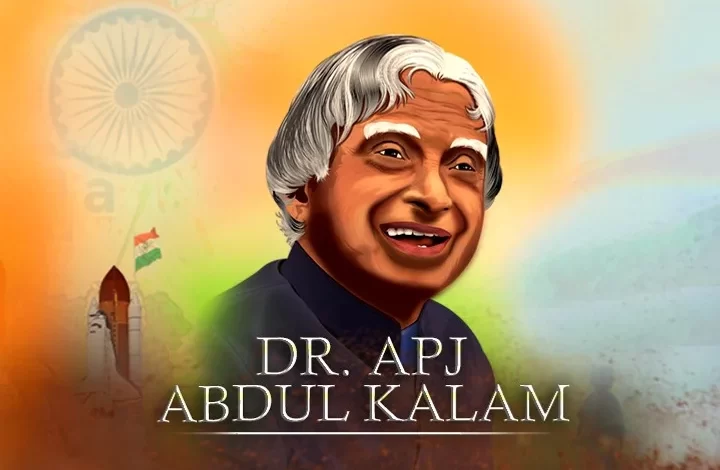Dr. APJ Kalam – an idol for one and all.

Dr. APJ Kalam grew up as a boy in the island town of Rameswaran in southern India. His father, Jainurabdine, a humble ship owner, was a devout Muslim and a close friend of the temple priest of Rameswaran. Kalam grew up in a multi-religious and tolerant society one with a progressive perspective. His father often quoted the Koran to help young Kalam see the world without fear.
Kalam’s day started at 4am and ended at 11pm. His father had no education, but wanted Kalam to study. Kalam got up at 4am, took a bath and went to math class. This class was taught by a teacher who for the entire session he accepted only 5 students. Bathing before class was a condition he imposed on all his students. After morning classes, Kalam would walk around town with his cousin Samsudin handing out newspapers.
There was no electricity in town, so kerosene lamps lit his house from 7:00 pm to 9:00 pm. But Kalam said he studied until eleven o’clock, so his mother saved some for later use. As he was a good student, Kalam was always supported by his teachers. Iyadurai Solomon of Schwartz High School used to tell Kalam that if he really wanted something, he could get it. “It made me fearless,” said Dr. Kalam. Outside school, Ahmed Jalaluddin and Samsudin, who later became his brothers-in-law, encouraged Kalam to appreciate the wonders of nature.
Thus, as he grew up, he was quickly exposed to both religious and practical worldviews. As a child, he was fascinated by the flight of birds, but it wasn’t until years later that he realized he wanted to fly an airplane. After school he studied physics at St. Joseph’s College in Trichy, but he was not satisfied. He regretted losing his three precious years when he discovered aeronautical engineering. But he is glad to have met Leo He Tolstoy, Thomas Hardy, F. Scott He Fitzgerald, and other British poets during his college years.
At Madras Institute of Technology (MIT), Chennai, Kalam studied aeronautics and learned an important lesson: the value of time. One day he was leading a system design project when the principal came to his class to see his work. He didn’t seem satisfied and the next day he told Kalam he wanted to complete the project in two days. Otherwise he will be deprived of scholarship aid. Kalam knew the importance of these two days as if he lost it his father’s years of toil will be undone. Kalam worked without food or sleep. On the last day his professor came to check on his progress.
He was impressed, saying, “I was stressing you out and asking you to meet a difficult deadline.” Kalam has managed several projects in his professional life, but has treated each one as his last. That was his passion. Not surprisingly, he has always managed projects. His adviser, Major General R. Swaminathan, described Kalam’s success as a leader. Dr. Kalam’s first major project, SLV 3, fails for the first time. , he was almost lying on the ground. It was around this time that Kalam’s childhood mentor Jalaluddin died. “A part of me died too…” said Dr. Kalam. However, he never considered retiring after his SLV-3. “I knew I had to work hard and persevere to succeed.” Then SLV-3 was launched again, this time successfully. He drew strength from philosophy, religion and literature to fill his professional setbacks. Over time, he also learned to deal with professionally jealous and uncooperative team members. He is an idol for one and all.
Success is Dr. Kalam. The Prithvi, Agni, Akash, Trishul, and Nag rockets were very successful. He was adorned with Padma Bhushan and Bharat Ratna, then became President of India. one of the few presidents who touched the hearts of so many poor children in the country












